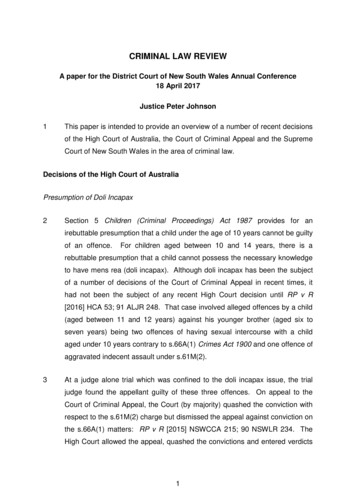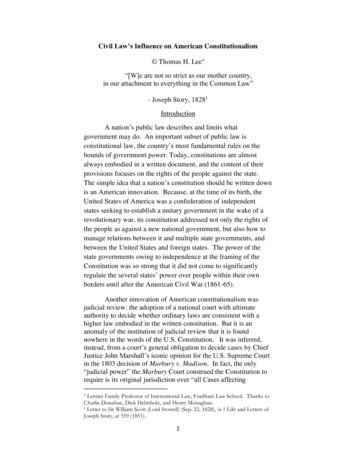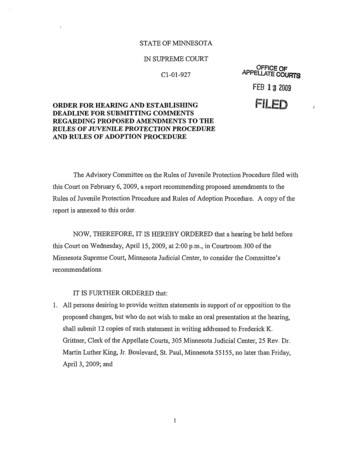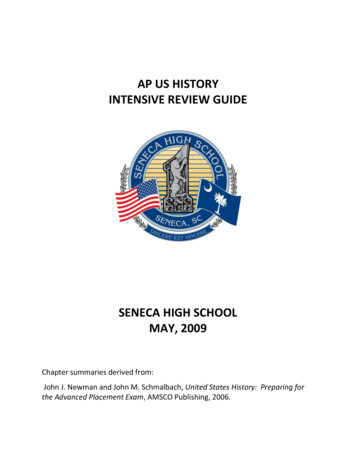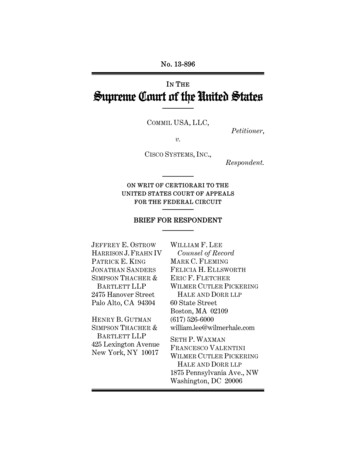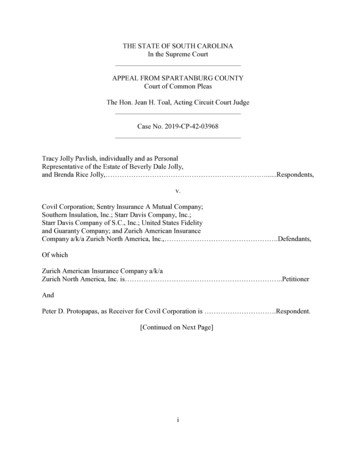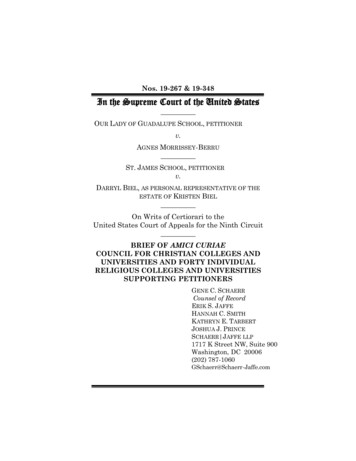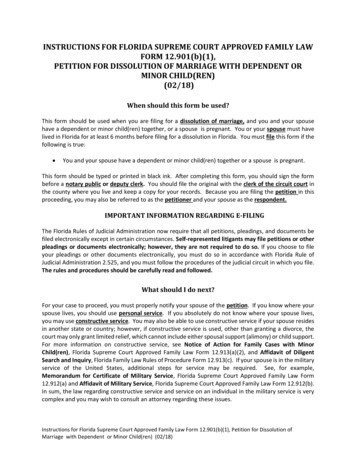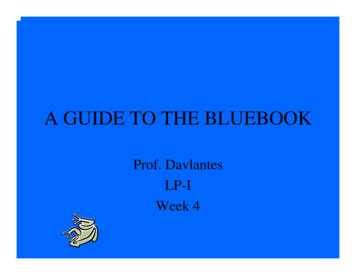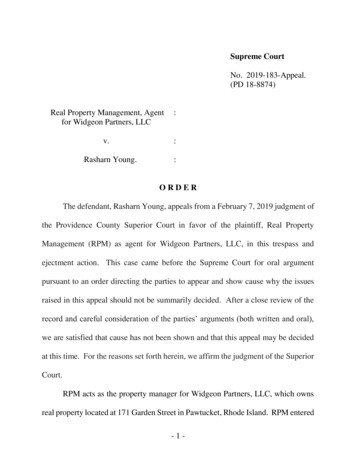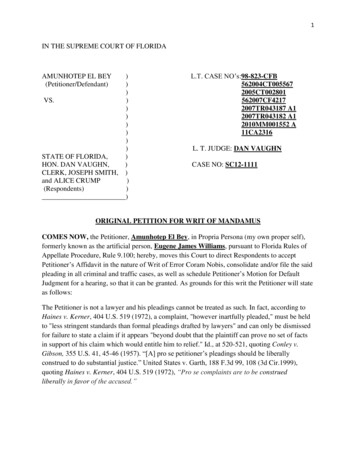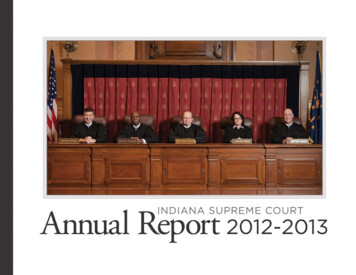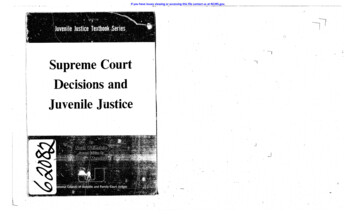
Transcription
If you have issues viewing or accessing this file contact us at NCJRS.gov.Supreme CourtDecisions andJ uvenile Justice.----
-r- --:-;-,-:-;;.NCJRSOCT 1.2 '979oACQUISI'''IONSca,\The National Council of Juvenile and Family Court: Judges and its NationalCollege of Juvenile Justice wish to extend their gratitude and appreciation to thefollowing for their support and encouragement of this textbook:"\1GSupreme Court.Decisions and"Juvenile Justice,('1National Institute for Juvenile Justiceand Delinquency PreventionOffice of Juvenile Justice and DelinqueI].cy PreventionLaw Enforcement Assistance AdministrationU.S. Department C)f JusticeWashington D.C.ByNoah WeinsteinRetired Judge of the 22nd Circuit Court of MissouriClayton, MissouriSecond Edition ByMax C. Fleischmann FoundationReno, Nevadajohn F. Mendoza\\Judge, Eighth Judicial District Court of NevadaLas Vegas, NevadaThis textbook was prepared under Grant Number 78-JN-AX-0024 from theNational Institute for Juvenile' Justice and Delinquency Prevention, Office ofJuvenile Justice and Delinquency Prevention, Law Enforcement Assistance Administration, U.S. Department of Justice. Points of view or opinions in thisdocument are those of the author and do not necessarily represent the officialposition or policies of the U.S. Department of Justice.IIu. . Department of J stlce.Nabonal Institute of Justice62 082ThIS document has been re rodfne; n r organization origin ting ego actf'Y .as received from theIS ocument are those of the' In S 0 VIew or opinions stated ent the cfficial position or pOIf;;! o :dNdOt' not nec ssarily"a lonal InstItute of,"Permission to reprod.grarlted by.uce thIs Copyrighted material has been-the Na.tiQnal COll .-and.Family Court ';;:! venilelto the Natronal Criminal JUstice Ae' F',erence ServIce (NCJAS).yrther reproduction outsIdehs,on of the copyright own r. of t e NCJRS system requirell permis-oi"National Council of Juvenile and Family Court JudgesUniversity of Nevada/RenoBox 8978Reno, Nevada 8 )'507Copyright, 1979First Edition Published 1973Second Edition Published 1979, I(!I""""""" - I.L"l
.--, ---- -- --------------- ---------,---,-, --- --- -,- --' '".",.".""" -- .,- ,, -""",.- - .-------------- --fIIJuveni Ie Justice Textbook SeriesEditorial i\dvisory BoardWILLIAM SYLVESTER WHITE, PRESIDING JUDGEJuvenile Division, Circuit Court of Cook; CountyChicago, IllinoisPresident, National Council ofJuvenile and Family Court JudgesThe Juvenile Justice Textbook Series is published primarily for use in trainingprograms of the National Council of Juvenile and Family Court Judges. Viewsexpressed in this textbook are not to be taken as the policy of the NationalCouncil of Family Court Judges unless clearly indicated.R.KENNETH ELLIOTT, JUDGESeventh Judicial Circuit CourtLiberty, MissouriChairman, Publications Committee,National Council of Juvenile and Family Court JudgesI LOUIS W. MCHARDYReno, NevadaExecutive Director,National Council of Juvenile and Family Court Judgesand Dean of the National College of Juvenile Justice1\I,IIIjIIILrtN.CORINNE SMITHEditor,Juvenile Justice Textbook Series/JIIu,rrIt'IIIIiiiii11\1t\\,- L --------------------, ;;;:::r1\t.,-
- ,- ,.-------- ---------'--'''---- --- \IIITable of ContentsI. PROCEDURAL RIGHTS OF DUE PROCESSA.rrIN GENERAL1. Kent v. U.S., 383 U.S. 541 (1966) . .People v. Bombacino, 280 N.E.2d 697 (Ill. 1972) . .U.S. ex rel. Bombacino v. Bensinger, 498 F.2d 875 (7th Cir. 1974) . .U.S. v. Bland, 472 F.2d 1329 (D.C. Cir. 1972) . .State v. Grayer, 215 N.W.2d 859 (Neb. 1974) . .People v. Fields, 199 N.W.2d 217 (Mich. 1972) . .In Re F.R.W., 212 N.W.2d 130 (Wis. 1973) . .State v. Smagula, 377 A. 2d 608 (N. H. 1977) . .Powell V. Hockel 453 F.2d 652 (9th Cir. 1971) . .Brown V. Cox, 481 F.2d 622 (4th Cir. 1973) . ; . .Sheppard V. Rhay, 440 P.2d 422 (Wash. 1968) . .2. Gault, 387 U.S. 1 (1967) . .3. DeBacker v.·Brainard, 396 U.S. 28 (1969) . .4. Winship, 397 U.S. 358 (1970) . , . .5. Ivan V. V. City of New York, 407 U.S. 203 (1972) . .6. McKeiver V. Pennsylvania; In re Burrus, 403 U.S. 528 (1971) . .7. Harris V. New York, 401 U.S.' 222 (1971) . .8. Kirby V. I!linois, 406 U.S. 682 (1972) . .9. U.S. V. Dionisio, 410 U.S. 1 (1973) . '. .10. U.S. V. Mara, 410 U.S. 19 (1973) . .II. State V. Ostrowski, 282 N.E.2d 359 (Ohio 1972) . .12. Breed V. Jones, 421 U.S. 519 (1975) . , . .13. Davis V. Alaska, 415 U.S. 308 (1974) . .14. Michaels V. Arizona, 417 U.S. 939 (1974) . .15. Oklahoma Pub. CO. V. District Court, 430 U.S. 308 (1977) . .16. Government of the Virgin Islands V. Brodhurst,285F.Supp. 831 (D.C.V.I. 1968) . .17. Stump \{. Sparkman, 435 U.S. 349 (1978) . .18. Morales V. Turman, 430 U.S. 322 (1977) . .19. Swisher V. Brady, 438 U.S. (1978) . I1!II1\l,L[1IN THE SCHOOLS1.2.3.4.Goss V. Lopez, 419 U.S. 565 (1975) . .Wood V. Strickland, 420 U.S. 308 (1975) . .Baker V. Owen, 423·U.S. 907 (1975) . .Ingraham V. Wright, 430 U.S. 651 (1977) . .2.5272930II. RIGHTS OF ILLEGITIMATE CHILDREN1. Levy V. Louisiana, 391 U.S. 68 (1968) . .2. Glona V. American G.& L Ins. Co., 391 U.S. 73 (1968) . .3232vLI:
-3. Labine v. Vincent, 401 U.S. 532 (1971) . .4. Weber v. Aetna C & S Co., 406 U. S. 164 (1972) . .5. Richardson v. Davis, 342 F. Supp. 588,cert. denied 409 U.S. 1069 (1972) . .6. Gomez v. Perez, 409 U.S. 535 (1973) . .7. Linda v. Richard, 410 U.S. 614 (1973) . .8. Willis v. Prudential, 405 U.S. 318 (1972) . .9. Griffin v. Richardson, 346 F.Supp. 1226, aff'd, 409 U.S. 1069 (1972) . .10. New Jersey Welfare Rights v. Cahill, 411 U.S. 619 (1973) . .11. Trimble v. Gordon, 430 U.S. 762 (1977) . .12. Mathews v. Lucas,427 U.S. 495 (1976) . " . .13. Norton v. Mathews, 427 U.S. 524 (1976) . " . , . .14. Fiallo v. Bell, 430 U.S. 787 (1977) . .III. !,\PARTI343535353638381. Goldberg v. Kelly, 397 U.S. 254 (1970) . .Wheeler v. Montgomery, 397 U. S. 280 (1970) .' . , . .Sniadach v. Family Finance, 395 U.S. 337 (1969) . " .2. Townsend v. Swank, 404 U.S. 282 (1971) . .3. Carter v. Stanton, 405 U. S. 669 (1972) . , . .4. Carleson v. Remillard, 406 U. S. 598 (1972) . .5. Wyman v. James, 400 U.S. 309 (1971) . .44444545454546Procedural Rights of Due ProcessIN GENERALKent v. U.S.383 U.S. 541, 16 L.Ed. 2d 84, 86 S. Ct. 1045 (1966)District of Columbia Juvenile Court's order waiving its exclusive jurisdiction and authorizing minor to be criminally prosecuted in district court held to havebeen entered without compliance with required procedure. ,DECISION:Juvenile interrogated by police - admitted burglary, robbery and rape.Juvenile court failed to grant or rule on juvenile's motions for (1) hearing (2) access tocourt's social records. (3) Court's order recited no reason for granting waiver and didnot refer to juvenile's motions.SUMMARY:RIGHTS OF CHILDREN VIS-A.-VIS RIGHTS OF PARENTSvi', --------,----L3 40404142'lfli3333PARENTAL RIGHTS1. Meyer v. Nebraska, 262 U.S. 390 (1923) . .2. Pierce v. Society o/the Sisters, 268 U.S. 510 (1925) . .3. Prince v. Massachusetts, 321 U.S. 158 (1944) . .4. Haley v. Ohio, 332 U.S. 596 (1948) . .5. Ginsberg v. N.Y., 390 U.S. 629 (1968) . .6. Tinker v. Des Moines School District, 393 U.S. 503 (1969) " . .7. Wisconsin v. Yoder, 406 U.S. 205 (1972) . .8. Parham v. J.L.,412 F.Supp. 112 (1976) Supreme Court Docket No. 75-1690.9. Kremens v. Bartley, 431 U.S. 119 (1977) . .10. In re Roger S., 569 P.2d 1286 (Ca. 1977) . .II. -Carey v. Pop. Services Internat'l, 431 U.S. 678 (1977) . , . .12. Planned Parenthood v. Danforth, 428 U.S. 52 (1976) . .13. Bellotti v. Baird, 428 U.S. 132 (1976) . .:----------- ---.,.---.- ---.32321. Armstrong v. Manzo, 380 U.S. 545 '(1965) . .2. Stanley v. Illinois, 405 U.S. 645 (1972) . .3. Quilloin v. Walcott, 434 U.S. 246 (1978) . .4. Smith v. Organ. Foster Families, 431 U.S. 816 (1977) . .IV. RIGHTS OF AFDC RECIPIENTSV.- 47474848484848515151535454l'/FIJuvenile indicted. In district court juvenile's motion to dismiss indictment becausewaiver was invalid was denied. Juvenile found guilty and sentenced 30 to 90 years inprison. Conviction affirmed by D.C. Court of Appeals. U.S. Supreme Court reversedand remanded to district court for a hearing de novo on issue of waiver.Fortas, for five members, held order waiving juvenile court jurisdiction was invalidfor failure:I. to grant hearing requested by juvenile,2. to give counsel for juvenile access to records,3. to state reasons for its order waiving jurisdiction."The Court refused to recharacterize the proceedings as "criminal" and automatically require the full compliment of criminal safeguards. Instead, the court indicated itwould rely on a functional analysis - that would ignore tradition as such and focus onthe consequences of the proceeding for the defendent, that is, the role that thesafeguard plays in assuring that the outcome of the proceeding is proper, and the cost tosociety of providing the safeguard.
--r.---1 -.-- ------ -------- .---------IiSUPREME COURT DECISIONS AND JUVENILE JUSTICEFortas in Kent attacked the notion that procedural rights available in criminal casesshould be denied merely on "the premise that the proceedings are 'civil' in nature andnot criminal." Since the juvenile court system attempts to provide guidance andrehabilitation for the child rather than to fix criminal responsibility and imposepunishment, state court', have often held that criminal safeguards need not be provided. But Fortas expre \sed serious doubts as to whether the consequences for adefendant in a juvenile proceeding diffe(vsignificantly in practical effect from thosefaced by an adult in a criminal prosecution. Citing "evidence" that many juvenilecourts "lack the personnel, facilities and techniques to perform adequately as representatives of tb.e state in a parens patriae capacity" the Court indicated that practicalshortcomings may be too great "to make tolerable the immunity of the process from thereach of constitutional guarantees applicable to adults."-- .--. ----.--------PROCEDURAL RIGHTS OF DUE PROCESS----- ---.--------- 3II'I"Short Cut" AvoidingKent Transfer Hearing by Useof the Prosecutor's Discretion:j-lIIIPeople (Illinois) v Bombac'280 N E 'd 69(1972). Where statute did no/; e 'u:1 . d .(I1I.),. cert. denied, 409 U.S. 912retain jurisdiction of case involvin J v m e JU ge. IscretI n to etermine whether toattorney discretion to make such de e I?e t omm ted by J Vl. -Ie but granted state's.ma IOn su Ject to 0 ject' b''1' dm wl?lc event matter was referred to chief jh !;re of circuit cour o u Juvem eJ. ge,reqUIre'1' d.,process I notf. Juv m e.J .ge to conduct heanng on state's attorney's petition t.rom /uvemle diVISIOn.0 remove caseII,U.S. ex rel. Bombacino v. Bensinger. 498 F. 2d 875 (7th C· ).U S 1019(1974) S b,.If. , cert. demed 419Having raised these basic questions, the Court disposed of the case on a narrowerground, holding that a hearing and access by counsel to the juvenile's "social service"file must be provided before the juvenile court can waive its jurisdiction over a minor.On this more specific issue too, the Court placed primary reliance on substance; itstressed the consequences of a waiver of jurisdiction - "potentially as important topetitioner as the difference between five years' confinement and a death sentence" and the practical value to the juvenile of having his attorney examine the pertinentrecords. Against this background, the Court construed the statute "in the context ofconstitutional principles" and concluded: "there is no place in our system of law forreaching a result of such tremendous consequences without ceremony - withouthearing, without effective assistance of counsel, without a statement of reasons."Thus, the opinion leaves little doubt that denial of important procedural safeguards instate juvenile courts will be subject to serious attack on due process grounds.I hlii ois tran fe st t:t:q : : e;! e ;; : i tnufh lds CO?stitutio ality(Juvemle or cnmmal court) for trial of juvenile.1'I01 letermme the forum 'r/' Blan , 4?2 F.2d .132 (D.C. Cir.), cert. denied, 412 U.S. 909 (1972) Thegis a ure may, Without vIOlatmg d I dejuvenile (family) court one who, alth ; O t ; ; ' : I: ,ebjurisdictio of th.eLI :; :s t\ :p: s: t f; i:1 discr ti?n)tth certain enumeratelo : s es n 11d1e cnmma court Due process dot.a versary hearing before the prosecutor determin'es what charge ise:il . reqUIre an1\IjhState v. Grayer, 215 N.\V.2d 859 (Neb. 1974)11ljIIVague Transfer Statutes:Availability of social reports to juvenile's counsel required by Kent not likely to belimited to waiver cases. Is this applicable to pre-sentence reports in criminal cases?Although the defendant has no constitutional right to view the pre-sentence report,see, e.g., United States v. Dockery, 447 F.2d 1178 (D.C. Cir. 1971); Fernandez v.Meier, 432 F.2d 426 (9th Cir. 1970), the trend is to provide the defendant with thereport. See Fed. R. Crim. Proc. 32 (c) (3); A.B.A. Sentencing Alternatives andProcedures, Standard 4.4 (1968); authorities cited in Dockery, supra at 1186-1201(Wright, dissenting).IReasons for Decisions:riJ:iIiMay be applicable to all juvenile decisions and even criminal courts if the Kentrequirement of " reasons for decision" for "meaningful review" is read in the context ofconstitutional principles of due process.IIIJState v. Smagula, 377 A.2d 608 (N.H 1977)' N.merely provided that for specified c .th'"1 ew ampsh.lre transfer statutecourt" The New Hh' S nmes, e Juvem e may be certIfied to the superiorKent tandards and a f t :t preme tCo t c nstrued the statute to incorporate thevague.' 0 cons rue , t e statute was not uncomtitutional1y----- -.LIII!,.IjI IiII'I, ·1.-- --------------IIw.,In Re F.R.212 N W 2d 130 (W' 197") W':o tional Th W'. l' .IS.) : Isconsm transfer law held constitu'uv :1 e I.sconsm aw rovided that a child may be transferred to adult court ifth o I :ret urt Judg deems It contrary to the best interests of the child or of the publiccase an enters an order waiving his jurisdiction.! IIPeople v. Fields, 199 N W 2d 217 (M' I 19".unconstitutional for lack of st ndards. The la ; ovi:e :th : lgan transf law ld?ver he .age of 15 years is accused of . . . a felon th any case were a c I1dl vestIgatIon and examination, including notice to par: ts e IU . . ma a rt e prosecutitt". . . . .pon mo IOn yh 'Id' tl ng a rn y, waIVe JunsdICtIon; whereupon it shall be lawful to try suchc I m 1e court avmg general criminal jurisdiction . . . . "Reports:.- . -- - -".--. -II1\! \L\.
--- ---. - ----.- ,-----:--',--- - -F ---- .- -- ---.---------------------------------------------- ---\lrlSUPREME COURT DECISIONS AND JUVENILE JUSTICE4PROCEDURAL RIGHTS OF DUE PROCESS5,jDefective Transfer Hearing Before Juvenile Court:Powell v. Hocker, 453 F.2d 652 (C.A. 9th, 1971): 'Right to counsel at transferhearing, notice and reasons fo; transfer, not waived by guilty plea in criminal trialwhere juvenile was represented by counsel. Judgment and sentence in criminal courtvacated.Brown v. Cox, 481 F.2d 622 (C.A. 4th, 1973): Invalid transfer hearing and subsequent guilty verdict in criminal trial does not require a reconstructed nunc pro tunchearing on transfer in all cases. Here the appellate court found "to a moral and legalcertainty that no juvenile court, on the record in this case, would have denied transfer"and held that this was not a case requiring a nunc pro tunc waiver hearing. Convictionaffirmed.Sheppard v. Rhay··t'.The boy's parents filed a petition for habeas corpus which was dismissed by theMaricopa County Superior Court and the Supreme Court of Arizona affirmed (99Ariz. 181, 407 P.2d 760).(1) Written notice of the specific charge or factual allegations, given to thechild and his parents or guardian sufficiently in advance of the hearing topermit preparation.by repeated misrepresentation of his age, waived his right to be'heardin Juvenile Court.(4) Absent a valid confession, a determination of d linquency and anorder of 'commitment based only on sworn testimony subjected to theopportunity for cross-examination in accordance with constitutional requirements.GaultBLACK concurred because the procedure was invalid solely because it violated, inthe four respects noted above, the fifth and sixth amendments made obligatory on thestates by the Fourteenth Amendment, and not because it was "unfair."The juvenile court committed the boy as a juvenile delinquent to the Arizona StateIndustrial School fora period of his minority, unless sooner discharged by due processof law.I(2) Notification to the child and his parents of the child's right to berepresented by counsel retained by them, or if they are unable. to affordcounsel, that counsel will be appointed to represent the child.Different result where juvenile misrepresented his age and was tried as an adult.Fifteen-year-old Gerald Gault taken into custody by sheriff of Gila County withoutnotice to his parents; taken to detention; mother was orally advised that he was placedin detention for making an obscene telephone call and that a hearing wouid be held thefollowing afternoon in juvenile court; a petition was filed on the date of the hearing,but was not served on or shown to the boy olihis parents. The petition Etated only that,the boy was a delinquent minor and made no reference to the factual basis for thejudicial action; the complainant was not present at the hearing and no qne was sworn;the juvenile officer stated that the boy admitted making the lewd remarks afterquestioning out of the presence of the juvenile's parents without counsei and withoutbeing advised of his right tD silence: neither boy nor his parents were advised Qf theboy's right to silence, or of the boy's right to be represented by counsel and of the rightto appointed counsel if they could not afford a lawyer.itOn appeal, the Supreme Court of the U. S. reversed. Fortas (for fin members) heldthe boy was denied due proces of law because juvenile delinquency proceedingswhich may lead to commitment in a state institution must measure up to the essentialsof due process and fair treatment including:(3) Application of the constitutional privilege against self-incrimination;and,387 U.S. 1, 18 L.Ed.2d 527,87 S.Ct. 1428 (1967) !f!.l440 P.2d 422 (Wash. 1968)HELD: Juvenile, concurred except he would not reach issues as to self-incriminati6i ,confrontation and cross-examination.WHITEHARLAN concurring in part and dissenting in part stated that juvenile 9urtproceedings must have the essential elements of fundamental fairness - notIce,counsel, and a record - but that imposition of requirements' regarding selfincrimination, confrontation and cross-examination should be deferred.STEWART dissented stating that while a state must accord every person due processof law, the constitutional restrictions applicable to adversary criminal trials should notbe applied to juvenile proceedings.(The maximum criminal penalty would have been two months.)Each of the Court's holdings required a safeguard in juvenile proceedings which wasformerly available only in criminal trials. But the cautious method of analysis adoptedby the Court indicates that while divergence between criminal and juvenile proceduresmay be disfavored in the future, it remains possible.l
- - - - - - - - - - - - - ,-,- -- --,.6SUPREME COURT DECISIONS AND JUVENILE JUSTICE. ,--,----.'----- -.- - PROCEDURAL RIGHTS OF DUE PROCESSThe Court argued that its item-by-item approach to procedural standards forjuvenile delinquency determinations both preserved flexibility for possible later differentiation between juvenile and criminal processes and displaced none of the dvantages of the present juvenile system, for example, the "commendable segregationof processing and treatment facilities used for juveniles from those used by adults," and .the attempt to avoid "criminal" nomenclature for juvenile offenders and to prevent .public disclosure of juvenile court records.Also, the Court refused to consider the implications of Gault for the pretrial phase ofthe juvenile process.Gault placed emphasis on the character of the sanctions rather than on the state'smotive for acting or on the labels it uses. Fortas derided the feeble enticement of thecivil label-of-convenience, and Harlan said that "the protections necessary herecannot be determined by resort to any classification of juvenile proceedings either ascriminal or as civil."The Court does not require juvenile courts to apply all the constitutional rightswhich a defendent might claim in a criminal case.Paralleling the civil-criminal distinction is the division betwc:;en proceedings whichadjudicate past conduct and those which determine present and future condition. Thefirst is factual and retrospective, involving no discretion or expertise. The second isprospective and involves a high degree of discretion or expertise. On its facts, Gaultdealt with the former. The issue at trial was whether to determine Gerald a delinquentbecause of the alleged lewd telephone call. The trial resembled traditional inquiriesinto criminal guilt. But a delinquency proceeding need not always follow this format.The gravamen 'of the complaint may not be asserted past conduct but predicted futuremisconduct - as bad company or beyond parental control allegations.Harlan concurring in part and dissenting in part concludes tha a right to adequateand timely notice, a right to counsel and to an adequate record should be required injuvenile court. They are fundamental and "should not cause any substantial modification in the character of juvenile court proceedings." But the privilege against selfincrimination, the right to confrontation, and cross-examination should not be implanted in children's courts "at least for the present." These protections "might. radically alter the/ character of juvenile court proceedings." They belong to "anintensely adversary system of criminal justice."Both conduct (past) and condition (present and future) depend on references to bedrawn froin past facts. Greater reliance on expertise is characteristic of conditiondetermination and the adversary system is suitable here. Experts have been known toerr, and it is in the nature of the adversary process that it is likely to discover or suggesterror. Moreover, the danger of arbitrariness is far greater in a system in which theexperts' judgment is conclusive rather than merely probative.The majority opinion does not speak directly to the preliminary proceedings, such asintake or informal police adjustments, or to the p6stadjudicated stages of disposition.However, Gault's effect on police work with juveniles is likely to be considerable. Inconcluding that "the constitutionf.ll privilege against self-incrimination is applicable inthe case of juveniles as it is with respect to adults" the Court has brought the Alirandadoctrine to the police handling of children. This can do violence to informalitybetween authority and youth. The recital of the Miranda warning is likely to suggestthat the state is about to do battle with a child and he had better watch his,step.A number of constitutional issues in fact':'finding hearings are left open:1. Are juveniles entitled fo all procedures and guarantees of adult criminaltrials?)2. Do the rules of evidence apply to juvenile hearings?3. Must the burden of proof be the same as in adult cases?.74. Must the juvenile judge state the grounds for his findings when he istrier of fact? At least one court has answered this question in thenegative. In re John H., 145 Cal. Reporter 357, 1978 (transcriptprovided basis for appellate review).5. Do juveniles have a right to a jury trial?6. Do juveniles have a right to public proceeding ?7. Do juveniles have a right to compulsory process i\:i1 obtaining witnesses?8. Are juveniles entitled to bail?.9. Does the Miranda doctrine apply to juvenile proceedings?10. Are juveniles protected against unreasonable searches and seizures?11. Are juvenile proceedings civil or criminal in nature, a combination ofboth, or neither civil nor criminal?12. Are juveniles entitled-to tral1scripts of the proceedings?13. Are juveniles entitled to full appeal procedures?14. Does the double jeopardy clause apply to juvenile proceedings?15. Must the juvenile proceeding be commenced by a presentment orindictment of a grand jury?16. Do juveniles have the right to a speedy trial?The scope of the holding in,Gault was limited by the Court's cautious approach.The opinion did not deal comprehensively with the adjudicative stage of the juvenileprocess. The Court explicitly declined to rule on the question 'of the right to appeal andto a transcript nor did the Court rule on the Sixth Amendment right to public trial.----- ------- -- -------- --.---.----'--.----- -.--.--Gault's holding relating to counsel and the privilege dces not apply to all factfindil1g hearings that may result in an adjudication of delinquency. These issues inGault were determined in the context of proceedings "which may result in commit-, ,(),.Ij l
- ,.8SUPREME COURT DECISIONS AND JUVENILE JUSTICEPROCEDURAL RIGHTS OF DUE PROCESSmentto an institution in which the juvenile's freedom is curtailed"; or, in commitmentto a state institution. Such a commitment, after delinquency adjudication, saysFortas, calls for the use of fundamentals of the adversary system.1Is Gault applicable when an order of commitment to an institution cannot resultfrom the fact-finding hearing? Is mere adjudication of "delinquency" of sufficientgravity as to require the assistance of counsel? Is it of "critical importance"? Cf Kent:indictment upset because hearing, which was refused, could not terminate in incarceration but it was of "critical importance" being a link in the chain of events that couldend in imprisonment.and Blo m prospective in application only and not applicable to trialsbegun PrIor to May 20, 1968, and DeBacker's trial was before that date.2. Issue of whether du process as violated by state statute requiring onlyprepon erance of eVIdence standard for burden of proof in juvenile courtproceedmgs would not be decided because appellant had not objected tosuch standard at the juvenile court hearing and had acknowledged at theSupreme Court argument that the reasonable doubt standard wassatisfied.'3. T e .right of the prosecutor to choose the forum, either juvenile orcnmmal court, would not be decided because this issue was not raised inthe juvenile court, and, although it was raised in habeas corpus petitionhad not been pa sed on in the state court, and this issue standing alon could not be reVIewed there being no indication that the issue drew intoquestion the validity of any Nebraska statute.Also consider: if parents of a child can afford private counsel who has the right toappear at all hearings affecting the child, is it not a denial of equal protection tochildren of the poor not to supply them with counsel at all stages of the proceedings?Note: Footnote at 387 U. S. at 31 N. 48 recognizes the "uniqueness" of the juvenilecourt's preadjudication and postadjudication processes, as follows: "Since this 'consentdecree' procedure would involve neither adjudication of delinquency nor institutionalization, nothing we say in this opinion should be construed as expressing anyviews with respect to such procedure. The problems of preadjudication treatment ofjuveniles and of postadjudication disposition are unique to the juvenile process; hence,what we hold in this opinion with regard to the procedural requirements at theadjudicatory stage has no necessary applicability to other steps of the juvenile process."In the Matter of Samuel Winship397 U.S. 358, 25 L.Ed.2d 368, 90 S.Ct. 1068 (1970)New Yo k statute authorizing determination of juvenile delinquency onp.repo derance of eVIdence, rather than on proof beyond a reasonable doubt, heldVIOlatIve of due process.DECISION:DeBacker v. BrainardTwelve-year-old boy had stolen B2.00 from a woman's pocketbook, which, ifdone by an .adult! ould constitut the; crime of larceny. Finding of delinquency andboy place m ramIng school, subject
The National Council of Juvenile and Family Court: Judges and its National College of Juvenile Justice wish to extend their gratitude and appreciation to the following for their support and encouragement of this textbook: National Institute for Juvenile Justice and Delinquency Prevention Office of
